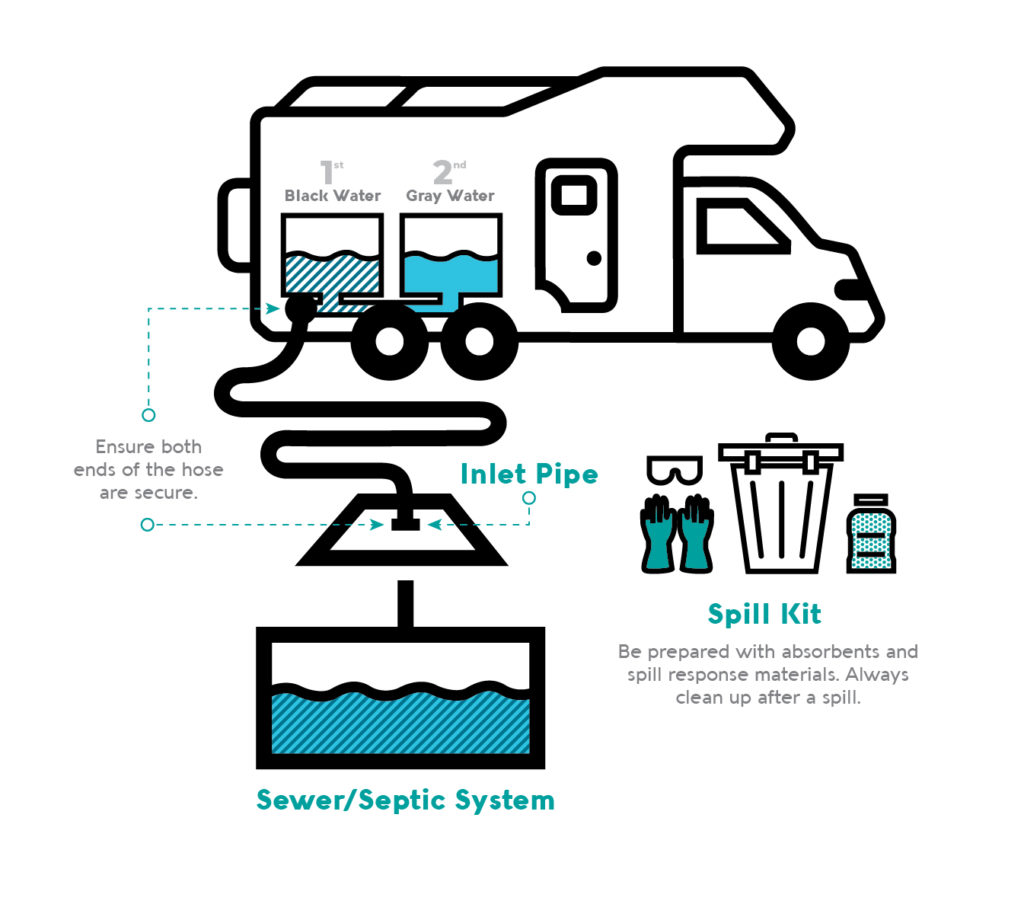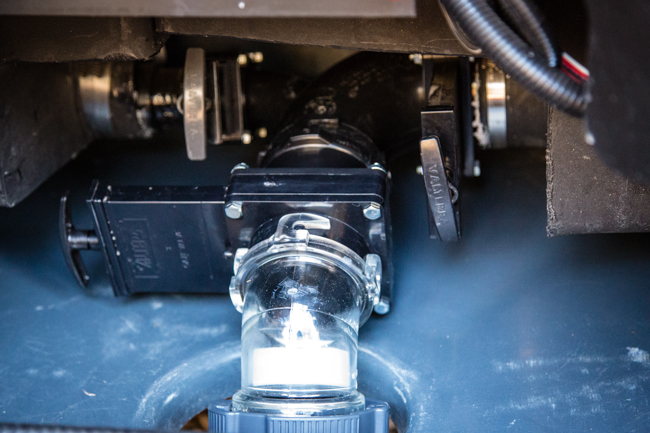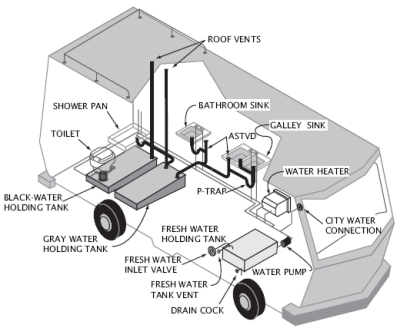Gray water in an RV is wastewater from sinks and showers. Black water is sewage from the toilet.
Understanding the difference between gray water and black water in an RV is essential for proper waste management. Gray water is less contaminated and typically comes from activities like washing dishes or taking a shower. This type of water can sometimes be reused for irrigation or flushing toilets.
Black water, on the other hand, contains human waste and requires careful disposal at designated dump stations. Properly managing these two types of wastewater helps maintain hygiene and extends the lifespan of your RV’s plumbing system. Knowing how to handle both types efficiently can make your RV experience more enjoyable and environmentally friendly.

Credit: h2oc.org
Introduction To Rv Water Systems
Water is essential for every RV trip. Managing water in an RV can be tricky. RVs have different water systems to handle various needs. Understanding these systems is crucial for a smooth journey. This guide will help you learn about RV water systems.
Importance Of Water Management
Proper water management in an RV ensures a comfortable trip. It helps conserve water and maintain hygiene. Efficient water use can prevent system failures. It also extends the lifespan of your RV’s water equipment.
Water management includes storing, using, and disposing of water. Each type of water needs special care. Let’s explore the types of water in an RV.
Types Of Water In An Rv
RVs deal with three main types of water:
- Fresh Water
- Gray Water
- Black Water
Fresh Water is clean and safe for drinking, cooking, and bathing. It comes from your RV’s fresh water tank.
Gray Water comes from sinks, showers, and washing machines. It is used water that is not as dirty as black water.
Black Water is the wastewater from the toilet. It contains human waste and toilet paper. Proper disposal is critical to avoid health hazards.
| Type of Water | Source | Safety Level |
|---|---|---|
| Fresh Water | Fresh Water Tank | Safe for all uses |
| Gray Water | Sinks, Showers | Not safe for drinking |
| Black Water | Toilets | Hazardous |
Gray Water Basics
Understanding gray water is crucial for RV enthusiasts. Gray water includes all the wastewater from your RV, except for the toilet. It can come from various sources and has many uses and disposal methods.
Sources Of Gray Water
Gray water in an RV comes from several sources:
- Kitchen sink: Washing dishes, rinsing food, etc.
- Bathroom sink: Brushing teeth, washing hands, etc.
- Shower: Bathing, rinsing hair, etc.
These sources generate water that is not heavily contaminated but still needs proper handling.
Common Uses And Disposal
Gray water can be used for several purposes:
- Flushing toilets: Helps conserve fresh water.
- Irrigation: Watering non-edible plants.
Proper disposal is essential to avoid health hazards. Here are common disposal methods:
- Use designated RV dump stations.
- Connect to sewer hookups at RV parks.
- Use portable waste tanks for off-site disposal.
Always follow local regulations for gray water disposal to protect the environment.
Black Water Basics
Understanding black water is crucial for every RV owner. Black water is waste water from toilets. It contains human waste, toilet paper, and other contaminants. Proper handling and disposal are vital for health and hygiene.
Sources Of Black Water
Black water mainly comes from the RV toilet. Anything flushed down the toilet contributes to black water. This includes human waste, toilet paper, and any other items thrown in the toilet.
Handling And Disposal
Handling black water requires care. Follow these steps for safe disposal:
- Use a sturdy sewer hose.
- Wear gloves to protect your hands.
- Connect the hose to the RV’s black water tank outlet.
- Attach the other end to the dump station.
- Open the tank valve to empty the black water.
Proper disposal of black water is essential. Dispose of it only at designated dump stations. Avoid dumping black water in unauthorized areas. This prevents environmental contamination and health risks.
| Step | Action |
|---|---|
| 1 | Use a sturdy sewer hose |
| 2 | Wear gloves |
| 3 | Connect the hose to the tank outlet |
| 4 | Attach the hose to the dump station |
| 5 | Open the tank valve |
Regular maintenance of the black water tank is crucial. Use tank treatments to break down waste and control odors. Clean the tank thoroughly after each trip.
Following these steps ensures your RV stays clean and sanitary. Proper handling and disposal of black water protect the environment and your health.
Key Differences
Understanding the difference between gray water and black water in an RV is essential. These two types of wastewater require different storage and treatment methods. Let’s dive into the key differences between gray water and black water.
Composition Differences
Gray water comes from sinks, showers, and washing machines. It includes soap, dirt, and food particles. It is generally less harmful than black water.
Black water is wastewater from toilets. It contains human waste and toilet paper. It is more hazardous and requires careful handling.
Storage And Treatment
In an RV, gray water and black water have separate storage tanks.
| Type of Water | Storage Tank | Treatment |
|---|---|---|
| Gray Water | Gray Water Tank | Can be treated and reused for non-potable purposes |
| Black Water | Black Water Tank | Must be disposed of at designated dumping stations |
Gray water tanks are usually larger than black water tanks.
Black water requires more careful disposal due to its hazardous nature.
Health And Safety Concerns
Understanding the difference between gray water and black water in an RV is crucial. Each type of water presents unique health and safety concerns. Knowing these risks helps you maintain a safe and healthy environment.
Gray Water Risks
Gray water comes from sinks, showers, and laundry. It is less hazardous than black water but still poses risks. Gray water can contain soap, grease, and food particles.
- Bacterial Growth: Stagnant gray water can breed bacteria.
- Odors: Improper disposal leads to foul smells.
- Skin Irritation: Contact with gray water may cause irritation.
Proper disposal and cleaning reduce these risks significantly. Always handle gray water carefully to avoid contamination.
Black Water Risks
Black water contains human waste from the toilet. It is highly hazardous and poses serious health risks. Handling black water requires extreme caution.
| Risk | Details |
|---|---|
| Pathogens: | Black water can harbor harmful bacteria and viruses. |
| Contamination: | Improper handling can contaminate drinking water sources. |
| Odors: | Black water produces strong, unpleasant odors. |
Use protective gear when dealing with black water. Always dispose of it at designated dump stations.

Credit: www.gonewiththewynns.com
Maintenance Tips
Maintaining your RV’s water system is crucial. Proper care prevents unpleasant smells and ensures a smooth journey. Understand the differences between gray water and black water. Follow these maintenance tips for a hassle-free experience.
Gray Water Maintenance
Gray water comes from your RV’s sinks and showers. It contains soap, food particles, and dirt. Maintaining your gray water tank is essential to avoid clogs and smells.
- Regular Dumping: Empty your gray water tank frequently. Do this every few days.
- Use Biodegradable Soap: Choose soaps that break down easily. This helps prevent buildup.
- Rinse the Tank: After emptying, rinse the tank with clean water. This helps remove remaining debris.
- Install a Strainer: Place a strainer in your sink drains. This catches food particles and prevents clogs.
Black Water Maintenance
Black water contains waste from your RV’s toilet. It requires careful handling and maintenance. Follow these steps to keep your black water tank in good condition.
- Use RV Toilet Paper: Only use toilet paper designed for RVs. It breaks down quickly, preventing clogs.
- Regular Dumping: Empty the black water tank when it’s two-thirds full. This helps avoid blockages.
- Flush the Tank: Use a tank flush system or garden hose. This removes waste buildup.
- Add Tank Treatment: Use special chemicals to break down waste. This helps control odors.
Maintaining both gray and black water tanks is vital. Proper care ensures a pleasant RVing experience. Follow these tips to keep your water system in top shape.
Environmental Impact
Understanding the environmental impact of gray water and black water in an RV is crucial. Proper management helps protect nature and ensures sustainable travel. Let’s dive into how both types of water affect the environment.
Sustainable Practices
Using sustainable practices in handling RV waste water is important. Gray water comes from sinks and showers. It contains soap and food particles. Black water comes from toilets and contains human waste.
Gray water can be reused for irrigation if treated. This helps conserve water. Black water needs proper disposal to avoid contamination. RV users should use biodegradable soaps and cleaning products. This reduces the environmental impact.
Installing water-saving fixtures in your RV is also beneficial. Low-flow showerheads and faucets help reduce water waste. These small changes make a big difference in the long run.
Legal Regulations
There are legal regulations governing the disposal of gray and black water. Each state and country has different rules. It is important to follow these regulations to avoid fines and protect the environment.
Gray water can sometimes be disposed of in designated areas. Black water must be emptied at specific dump stations. RV parks often provide these facilities. Proper disposal prevents water pollution and health hazards.
Always check local laws before disposing of any waste water. This ensures you are compliant and environmentally responsible. Following these regulations helps keep our natural spaces clean and safe.

Credit: www.happilyrv.com
Understanding the difference between gray water and black water in an RV is crucial. Gray water is wastewater from sinks and showers. Black water comes from the toilet. Proper disposal ensures a safe and comfortable RV experience. Always follow local regulations for waste management.
Happy and responsible RVing!
FAQs:
What Is Gray Water In An RV?
Gray water in an RV is wastewater from sinks and showers. It does not include sewage. This water can be reused for certain purposes, like flushing toilets.
What Is Black Water In An RV?
Black water in an RV is sewage waste from the toilet. It contains human waste and toilet paper. Proper disposal is essential to maintain hygiene.
How To Dispose Of Gray Water?
Gray water must be disposed of at designated dump stations. Never release it on the ground. Proper disposal ensures environmental safety and adherence to regulations.
How To Dispose Of Black Water?
Black water should be emptied at RV dump stations. Use gloves and follow proper sanitation procedures. This helps maintain hygiene and prevent contamination.
